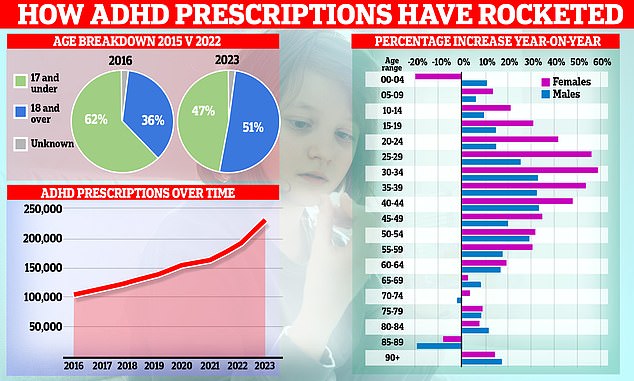There must be a “radical rethink” of how autism and ADHD are assessed and treated if the NHS is to cope with growing demand for care, according to a report.
Doctors are referring five times more patients for autism evaluations than in 2019, while the number of medications prescribed for ADHD has increased by 51 percent.
Health leaders warn that the NHS has been overwhelmed by the “extraordinary, unforeseen and unprecedented” rise in demand for these services.
And they say it is “impossible to imagine” how the NHS can expand quickly enough to cope with the surge.
The Nuffield Trust think tank, which produced the report, says the growth in demand has been driven by “changing social attitudes and increasing awareness”.

Fascinating graphs show how prescriptions for ADHD have increased over time, with patient demographics shifting from children to adults, with women in particular now driving the rise.


Sheridan Smith, 42, recently revealed that she was diagnosed with attention deficit hyperactivity disorder (pictured in 2023). The 42-year-old, who rose to fame on The Royle Family as Antony’s girlfriend Emma, told Vogue that it has helped her “make sense of a lot of things” in her life and better understand the “noise of deep in your brain.”


The booming market is thought to have been boosted by celebrities including model Katie Price and Love Island star Olivia Attwood (pictured) speaking out about their ordeal with ADHD and waits of up to ten years for an NHS assessment.
And it calls for a “whole systems approach” to neurodiversity in education, society and the health service.
It comes after figures released by NHS Digital last month revealed that the number of patients waiting for an autism assessment in England is at its highest level since current data began in April 2019.
Some 172,040 people were on waiting lists in December 2023, compared to 117,020 a year earlier and more than five times the 32,220 registered in December 2019.
Although the National Institute for Health and Healthcare Excellence (Nice) recommends that people with suspected autism be diagnosed within three months of referral, some 147,070 patients had been waiting at least 13 weeks in December, more than six times the 24,250 of December 2019.
People who had a first appointment for suspected autism between October and December last year waited an average of more than nine months to be seen after their referral.
This compares to four months during the same period in 2019.
Meanwhile, there was a 51 percent increase in the number of patients prescribed medications for attention deficit hyperactivity disorder (ADHD) during the same period.
Within this, there was a 28 percent increase among those aged 10 to 14 and a 146 percent increase among those aged 30 to 34.
Thea Stein, chief executive of the Nuffield Trust, said: “The extraordinary, unforeseen and unprecedented increase in demand for autism assessments and ADHD treatments has completely overwhelmed the NHS’s ability to meet them.”
‘It is frankly impossible to imagine how the system can grow fast enough to meet this demand.
‘We should not underestimate what this means for children in particular: many schools wait for a formal assessment and diagnosis to access support, and children and their families suffer while they wait.
«We are only now beginning to recognize how many people are neurodiverse.
‘The challenge is that we have an outdated health service model to deal with this avalanche of need.
‘The huge increase detailed in our analysis is likely due to a combination of changing social attitudes and increased awareness.
‘We urgently need to understand the different elements of this complex picture and find a comprehensive systemic approach spanning education, wider society and the health service.
“Investing more money in the current model is certainly not the solution: a radical rethink is required.”
Estimates show there could be up to 1.2 million autistic people and 2.2 million people with ADHD in England.
NHS England announced last week that it would launch a new taskforce to examine a worrying rise in the number of adults and children diagnosed with ADHD.
Experts have warned that dishonest private clinics are overdiagnosing the disease and have questioned the widespread prescription of powerful stimulant drugs to treat it.
The booming market is believed to have been fueled by celebrities such as model Katie Price and Love Island star Olivia Attwood speaking out about their ordeal with ADHD and waits of up to ten years for an NHS assessment.
Social media is also full of users telling how the medications helped them calm down, control their restlessness, and increase their concentration.
Long wait times for autism and ADHD can prevent people from getting the educational support and medications they need.
A recent report warned that failing to provide children with effective autism support can lead to a higher prevalence of mental illness and a higher risk of school exclusion.
A spokesperson for NHS England said: “The NHS is fully committed to supporting and improving the lives of people with ADHD and autism, which is why we have published new national guidance to help local areas manage the 50 per cent increase. in the derivations they have seen in recent years. last year.
“NHS England has also launched important work to investigate challenges in the provision of ADHD services and last month launched a cross-sector working group alongside the government, to help provide a joined-up approach for the growing number of people who request support.”
